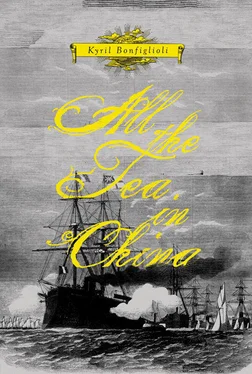As I plied my glass with a will, Peter grew more concerned.
“Karli, I beg you, take advice: that is no common puggle-pawnee or nose-paint, it is like firing a charge of dismantling shot into the brain.” I smiled at him reassuringly and sang a stave or two to show how little I had been affected.
“Listen, Karli. Listen , you booby. In an hour you have to do business with a Chinese dealer in porcelains. Business , Karli. Porcelains ! For a great deal of money !”
That fetched me. With a magnificent gesture I swept everything off the table, gave Peter my purse and rose to my feet. After the third or fourth attempt I succeeded in rising to them. Peter lugged me to the booth of a Chinese apothecary, where they made me drink something to make me sick; then something else, hot and bitter, which cleared the fumes from my brain. I clearly recall that on the druggist’s counter there was a glass jar full of curious objects and I continued to drink the bitter drench until I could focus my eyes on all the little scraps of ivory, amber, jade, roots and pebbles in the jar. Amongst them was a tooth. It was a human incisor, but half the size of a playing-card, a sure proof that giants had indeed once walked the earth. I longed to buy it but Peter hustled me out. To this day I still wish I had bought it.
At the Dutch Factory I was again quite sober although a little exalted. A fat, richly-clad merchant awaited me in a side-room, accompanied by the interpreter and a disdainful person sitting at a window with his back to us. This last was a merchant of the Hong, for no commerce could take place except through such a person. The porcelains laid out for my approval were good, several of them of a quality such as I had never handled. I picked up the very best piece of all, which I sensed had been included to test my knowledge; it was a plain, undecorated bowl of the richest, deepest ox-blood colour and could not have been later than the fourteenth Century. I put it down again and turned on my heel. I knew nothing of Chinese practice in these matters but I have a deep, inherited knowledge of how to deal with Gentile antique-dealers.
I lit a cheroot and addressed the interpreter.
“Tell this old person that he is under a misapprehension. I am not a drunken sailor looking for trinkets to take home as presents for whores. I have serious funds to dispose of and wish to buy serious wares. Imperial wares. Wares with six-character marks. If he has nothing better than these earthenware beggars’ bowls, tell him to borrow some from a dealer of seriousness. I shall be here at ten o’clock tomorrow morning.” He caught the small gold coin I flipped at him and bowed me out of the room. Peter was vastly impressed.
I was ill in the night, but not through trepidation.
The wares laid out the next morning were indeed of serious quality, I separated some two-thirds of them and asked a price. The dealer named one.
“Tell him,” I said to the interpreter, “that, when I wish my gravity to be relaxed, I go to where some professional story-teller has unrolled his mat, but when I am conducting business a certain heaviness of the spirit makes it difficult for me to unbend in merriment.” We began to deal. Twice the dealer began to re-pack his wares, thrice I began to walk out of the room with well-feigned impatience. At last we struck a bargain and the dealer put a little dab of ochre on my pieces. When I said that he should return that evening with more and better goods, his face went even blanker than it had been all through our chaffering.
“Wanchee see cash,” explained the interpreter. I showed him enough to convince. By the end of the afternoon I owned porcelain of a quality and quantity beyond my wildest dreams, and still possessed £200 in notes and gold. I was well satisfied. The merchant’s porters carried all away: it was explained to me that it would be at Whampoa, carefully packed and crated, before we sailed. Naturally, I hated to let it out of my sight, but I knew that no merchant with his knowledge would stoop to sharp practice once a deal had been struck.
As I left the room I heard the Hong merchant, who had stared silently out of the window for most of the day, stir in his chair and begin to click his abacus. He had made, no doubt, a pretty commission. For my part, I had made, at the smallest estimate, some twenty-five thousand per centum profit on my capital.

At Whampoa I found Blanche looking radiant, puzzlingly radiant. I could not help wondering whether she had been practising her late-found skill with one or another of the handsome young Europeans. I particularly wondered whether she had fallen in with any Dutchmen and perhaps tried on them the phrases I had taught her. But I was never a jealous man.
We made but a poor passage down towards the open sea: the winds were either dead foul — and often there was little sea-room for tacking — or else they were non-existent. The Captain’s temper deteriorated hourly; it erupted when the cooper, hat in trembling hand, reported that many of the water-casks were foul.
“Some of ’em’s salt, Sir, and some of ’em’s foul; there’s a liddle dead dog floating in one of ’em. I jest can’t understand it, I watched every one of ’em filled with me own eyes and lidded ’em with me own hands.” He held out his gnarled hands as though they were evidence.
The Captain’s face changed in the most terrifying way: it darkened and swelled until all around expected him to fall to the ground in an apoplexy. But he stepped forward and smashed his fist into the Cooper’s mouth. The Cooper scrambled to his feet and spat a bloody tooth into the scuppers.
“Begging your pardon, Sir,” he mumbled with a sort of dignity, “I signed to be flogged, but I never signed to be struck in the face.” The Captain was twitching all over, his face working, his hands clutching and clutching convulsively.
“Then flogged you shall be,” he whispered at last. “Flogged you shall be. Yes; yes, you shall. Just as soon as we have re-watered, for after the flogging that you are to have you won’t be fit to work for many a day. Oh, many and many a day.”
I must say that I felt a little sympathy for the poor fellow; he was fond of rum and had doubtless been deceived by some Chinese sleight-of-hand, but on the other hand he knew very well that all our lives depended upon his care for the water-casks. Had the spoiled casks not been discovered until we were many miles from a landfall we might have been in grave trouble.
As it fell out, although we were close to many landfalls, we were in the gravest trouble, although we thought it no more at the time than a vexing delay in our race to bring the new season’s teas to London.
A course was set for one of the smaller islands of the Ladrones group — but one where the Admiralty Directions said that there was a safe anchorage and sweet water. By manning the sweeps we reached this anchorage just at dusk and dropped our hook some six or eight cables’-length from the shore. There was nothing to see to landward except the glints of two or three driftwood fires, from the hearths of hovels pitched among the wind-stripped palms.
“Mister,” growled Captain Knatchbull to the Second (who was now, as I have explained, entitled to that form of address since the First was at death’s door and at Macao, whichever be the nearer), “Mister, I’ll have all hands, idlers and all, ready at first light to go ashore to scour and refill water-casks. You’ll see to it that every man who touches a cask will scratch his name or mark on a stave — and may Christ protect anyone who has handled a cask which proves foul, for he’ll get no mercy from me.”
Читать дальше













